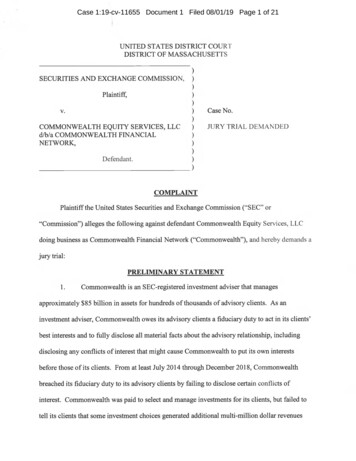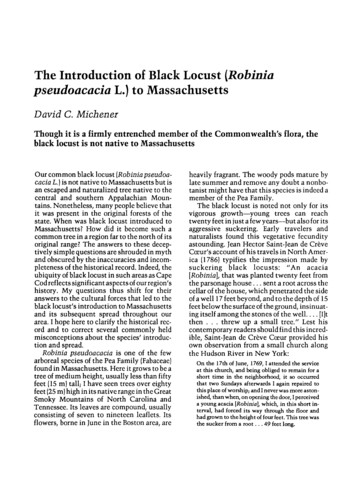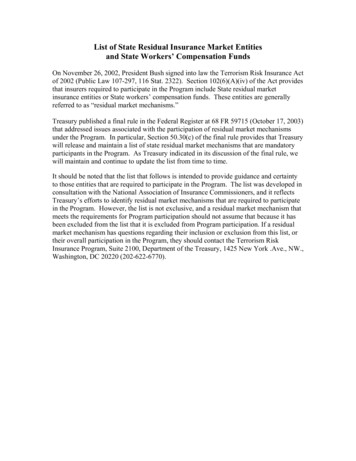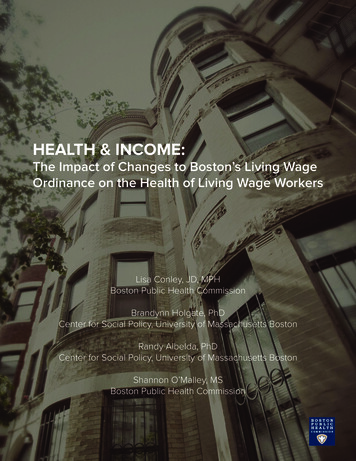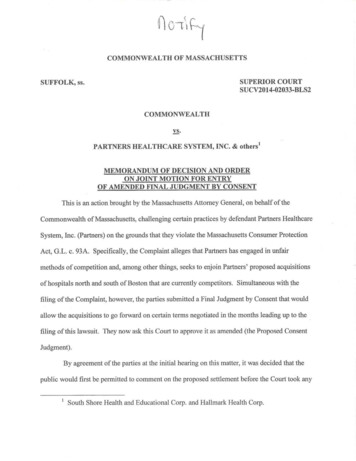
Transcription
flOTifvCOMMONWEALTH OF MASSACHUSETTSSUFFOLK, ss.SUPERIOR COURTSUCV2014-02033-BLS2COMMONWEALTHvs.PARTNERS HEALTHCARE SYSTEM, INC. & others1MEMORANDUM OF DECISION AND ORDERON JOINT MOTION FOR ENTRYOF AMENDED FINAL JUDGMENT BY CONSENTThis is an action brought by the Massachusetts Attorney General, on behalf of theCommonwealth of Massachusetts, challenging certain practices by defendant Partners HealthcareSystem, Inc. (Partners) on the grounds that they violate the Massachusetts Consumer ProtectionAct, G.L. c. 93A. Specifically, the Complaint alleges that Partners has engaged in unfairmethods of competition and, among other things, seeks to enjoin Partners' proposed acquisitionsof hospitals north and south of Boston that are currently competitors. Simultaneous with thefiling of the Complaint, however, the parties submitted a Final Judgment by Consent that wouldallow the acquisitions to go forward on certain terms negotiated in the months leading up to thefiling of this lawsuit. They now ask this Court to approve it as amended (the Proposed ConsentJudgment).By agreement of the parties at the initial hearing on this matter, it was decided that thepublic would first be permitted to comment on the proposed settlement before the Court took any1South Shore Health and Educational Corp. and Hallmark Health Corp.
action on a joint motion for approval. In so doing, the Court would loosely follow a procedure,set forth in a federal statute, the Antitrust Procedures and Penalties Act (also known as theTunney Act), that is used by federal courts called upon to approve antitrust settlements. See 15U.S.C. §16. Although some supported the settlement (or more accurately, the proposedacquisitions), many - among them entities and individuals the most knowledgeable about healthcare — were sharply critical of the deal that the parties had reached.At a full day hearing heldon November 10, 2014, this Court discussed the public comments with the parties and heardextensive arguments regarding the legal standard that guides this Court's determination. Aftercareful consideration of the parties' submissions together with the public comments, this Courtconcludes that the Proposed Consent Judgment must be rejected, for two reasons.First, it is not in the "public interest' as that has been defined by the case law. Bypermitting the acquisitions, the settlement, if adopted by this Court, would cement Partners'already strong position in the health care market and give it the ability, because of this marketmuscle, to exact higher prices from insurers for the services its providers render. These Partnersdriven increases in costs are estimated by an independent state agency, the Massachusetts HealthPolicy Commission (HPC), to amount to tens of millions of dollars a year. Those costs willultimately be borne by consumers and employers in the form of higher insurance premiums andhigher deductibles on their insurance plans. The Proposed Consent Judgment, which containstemporary price caps and other so-called "conduct-based" remedies, does not reasonably oradequately address the harm that is almost certain to occur as a consequence of theanticompetitive conduct by Partners that the Complaint describes.Second, this Court has serious concerns as to the enforceability of the Proposed Consent-2-
Judgment. Where a consent decree contemplates ongoing judicial involvement, as it does here,and there are substantial questions regarding enforcement, this alone is sufficient to reject it. TheProposed Consent Judgment envisions a ten-year period during which this Court could be calledupon to resolve disagreements among the parties in at least ten different areas, including oncomplicated issues relating to health care pricing. Moreover, this lawsuit is brought at a timewhen the entire health care field is undergoing enormous change. This Court is ill-equipped tokeep abreast of those changes as they unfold over the next decade or to predict at this point howsuch changes might affect the meaning and application of the Proposed Consent Judgment goingforward. Certainly, there is reason to doubt that this Court has the technical competence orresources required to resolve the disputes that are certain to arise under this consent decree if itwere approved.This Court makes its decision fully aware that, as a general rule, litigation settlementagreements should be viewed with favor, and, that the Court owes some deference to decisionsby the prosecutor—here the Attorney General. In rejecting the Proposed Consent Judgment,this Court does not question her good faith. That said, the Proposed Consent Judgment doeslittle to restore any part of the competition that would be lost by these two proposed acquisitions.And the remedies that are proposed are temporary and limited in scope - like putting a band-aidon a gaping wound that will only continue to bleed (perhaps even more profusely) once the bandaid is taken off Certainly, the Attorney General can make a decision not to pursue Partners at2 Thenegotiations were conducted and the settlement reached when the Attorney General was Martha Coakley.Since the hearing, a new Attorney General, Maura Healy, has assumed office. In a filing with this Court just daysago, she made it clear that, had she been the Attorney General at the time, she would not have approved thesettlement, seeing some of the same problems with the Proposed Consent Judgment that this Court identifies in thismemorandum. Although this did not affect this Court's ruling, it is relevant to what is likely to occur in itsaftermath, since Healy vowed to vigorously pursue litigation against Partners in the event this Court rejected theProposed Consent Judgment.-3-
all. But see fn. 2, supra. But when she asks for this Court's assistance in enforcing a consentdecree, the Court has some say as to whether it is going to put the power of the judiciary behindit. This Court concludes that it cannot do so in good conscience.BACKGROUNDBecause of the parties' agreement to a public comment period, this Court relies on morethan the allegations in the Complaint in its evaluation of the Proposed Consent Judgment. Thecomments, which came from a variety of sources, contain data and other information (much of itundisputed) that provide an important factual context for this Court's decision. To the extent thatthose comments express opinions, the Court has assessed those opinions in light of the responsesthat the parties have given to them, keeping in mind the extent to which those comments may (ormay not) be relevant to the issues before the Court. Among the commenters is the MassachusettsHealth Policy Commission (HPC), which has independently reviewed the proposed acquisitionsas required by the law that created it, Chapter 224 of the Acts of 2012. See G.L. c. 6D, § 13.Pursuant to that law, the HPC's reports can be considered as evidence in a judicial proceeding.G.L. c. 6D, § 13(h).This Court would add, however, that it is not making factual findings. Rather, it isconsidering the information before it in line with what the parties agreed to, much like a federaldistrict court would do in deciding whether to approve an antitrust settlement. Significantly, theAttorney General opposed this Court's taking of any testimony (for example, from expertwitnesses) or appointing a special master to assist it, not because these options were legallyunavailable (they are, under the Tunney Act) but because the Attorney General made it clear thatshe was willing to rest on the record before this Court. See Transcript of November 10, 2014-4-
Hearing at p. 170. That record, summarized in this section, does not assist the parties in theirrequest that this Court approve the Proposed Consent Judgment.A. The PartiesPartners is a Massachusetts not-for-profit corporation headquartered in Boston. Itoperates the largest health care provider system in the state. Partners was founded in 1994 whenBrigham and Women's Hospital (the Brigham) and Massachusetts General Hospital (MGH)became affiliated. Those two hospitals are academic medical centers (or AMCs) that serve as theprincipal teaching hospitals for Harvard Medical School. In addition to those two hospitals.Partners currently owns seven other general acute care hospitals in Massachusetts: FaulknerHospital (associated with the Brigham); Newton-Wellesley Hospital; Union Hospital and SalemHospital (collectively, North Shore Medical Center); Martha's Vineyard Hospital; NantucketCottage Hospital; and Cooley Dickinson Hospital. It owns a psychiatric hospital (McLean), ahome care agency, and a network of rehabilitation facilities including Spaulding RehabilitationCenter. Partners also negotiates contracts with health insurers on behalf of approximately 6,200primary care physicians.Not surprisingly. Partners is also quite large financially. In fiscal year 2012, the annualrevenue of Partners was approximately 9 billion, an increase of approximately twenty percent inthe last four years. HPC Letter dated July 17, 2014, at 10. Its total net assets are more thandouble the combined assets of the next five largest systems in Massachusetts. Id. It accounts formore than half of the commercial discharges in the state and receives nearly one-third of allcommercial payments to acute care hospitals.South Shore Health and Educational Corporation (South Shore) is a Massachusetts not--5 -
for-profit corporation with a principal place of business in South Weymouth, Massachusetts. Itis the parent company of South Shore Hospital (SSH), a large acute-care hospital in SouthWeymouth, Massachusetts located about seventeen miles south of downtown Boston. SSH is thelargest hospital in its region, with net patient services revenue nearly double that of the nextlargest hospital in the area. Its managed care network includes 400 physicians, making it theseventh largest physician network in the state. It is in strong financial condition, withsubstantially greater operating revenue and assets than other hospitals in the area. HPC Letterdated July 17, 2014, at 11.Hallmark Health Corporation (Hallmark) is a Massachusetts not-for-profit corporationwith a principal place of business in Medford, Massachusetts. It is the parent company of twocommunity hospitals: Lawrence Memorial Hospital in Medford, Massachusetts and MelroseWakefield Hospital in Melrose, Massachusetts. These hospitals are located approximately sevento ten miles to the north of downtown Boston and serve the metro-north area. Hallmark also hasa number of outpatient facilities in the same region and has a managed care network ofapproximately 400 physicians. According to data compiled by the HPC, Hallmark's operatingmargin is high compared with those of community hospitals in the same area, and its cashreserves are strong. Although Hallmark did present information to this Court showing that itsustained a substantial loss in the early part of 2014, HFC's conclusion based on its own analysisof the data provided by the parties is that Hallmark's "financial position is positive andimproving" and "does not indicate that financial distress is motivating its decision to affiliatewith Partners." HPC Review of Partners Healthcare System's Proposed Acquisition of HallmarkHealth Corporation, Preliminary Report, July 2, 2014, at 18.-6-
B. The Proposed AcquisitionsOn December 21, 2012. Partners and South Shore entered into an agreement that wouldgive Partners control of SSH. Partners and South Shore currently compete against each other inthe provision of general acute-care inpatient services sold to commercial health plans in theSouth Shore region of the state. The proposed acquisition would eliminate this competition.On July 19, 2013, Partners subsidiary Brigham and Women's Physician Organization (BWPO)executed a Memorandum of Understanding to acquire South Shore's managed care network ofapproximately 400 physicians which includes Harbor Medical Associates (Harbor). Harborprovides primary and specialty care services to patients in the South Shore region.On January 31, 2014, Partners and Hallmark executed an agreement whereby Partnerswould acquire Hallmark and its affiliates, including its two acute care hospitals, LawrenceMemorial Hospital and Melrose-Wakefield Hospital, as well as multiple outpatient facilities.For the previous eighteen years, Hallmark and Partners had a relationship which allowedHallmark to contract with most of the major payers through Partners; they also had a clinicalrelationship. The acquisition would expand the existing relationship between Partners andHallmark, giving Partners full control over Hallmark.If these acquisitions are approved. Partners will add three acute care hospitals to itssystem within the Greater Boston area and at least 800 physicians. The acquisitions will alsoeffectively eliminate Hallmark and South Shore as Partners' competitors.C. The Attorney General's Investigation and the ComplaintWell before the agreements described above were executed, the Attorney General'sOffice was investigating Partners for anticompetitive practices. Beginning in 2009, the Attorney-7-
General issued a number of Civil Investigative Demands regarding Partners' practice ofcontracting with unaffiliated doctors in dealing with health insurance companies (referred to as"payers") so as to obtain higher reimbursement rates. When the proposed acquisitions wereannounced, the Attorney General issued additional Civil Investigative Demands. Shecoordinated her investigation with a similar one being conducted by the United StatesDepartment of Justice (DOJ).The outcome of that investigation was the instant Complaint alleging that Partnersviolated G.L. c. 93 A, §2. The Complaint noted that competition in the provision of health careis necessary in order to "reduce costs, increase quality, improve service, and spur innovation."Complaint at 115. More particularly, if lower cost health care plans are to be made available toemployers and individuals, payers must be able to negotiate competitive prices with providers,but a payer's ability to negotiate that lower price depends on whether it can credibly threaten toexclude a hospital from its insurance plan. Complaint at 117. If patients are willing to keep thehealth plan without that hospital included, then the payer is better able to resist a hospital'sdemand for price increases. If that threat is not credible, then the payer is more likely to accedeto the hospital's demands. Although patients choose health care providers based on a number offactors, the provider's geographic proximity to the patient is one of them. Complaint at *[ 18.Thus, where a single provider dominates a geographic market, then it can threaten to exclude itshospitals from the network offered by a plan and thus force the payer to capitulate to its3For a lawsuit of this importance, the Complaint is quite short, its allegations written inthe most general terms. For purposes of this Court's analysis, however, what is most importantis the harm that the Complaint alleges. A settlement cannot be rejected for its failure to addressharms not alleged; thus, the Complaint sets some limits on how the Court approaches the issuesbefore it.-8-
demands.The Complaint alleges three harms. See fn. 3, supra. The first concerns the South Shoreacquisition. South Shore and Partners currently compete against each other in the market forgeneral acute care inpatient hospital services sold to commercial health plans. That marketconsists of the South Shore region. Complaint at 21-23. If permitted to acquire South Shore,Partners would eliminate that "significant" competition, thus enabling it to raise prices.Complaint at 24.The second harm concerns the Hallmark acquisition. By expanding the existingrelationship between Partners and Hallmark, Partners would have full control over Hallmark andthus eliminate "significant potential competition" in the relevant geographic market, namely theBoston and greater Metro-North area. Complaint at27-30. As it would with the South Shoreacquisition, Partners would then be in a position to raise prices. Complaint at25. In sum, bothacquisitions would substantially lessen competition in the health care market for acute careinpatient health services in portions of Eastern Massachusetts, resulting in higher health costs forconsumers. Complaint at 3.The third harm alleged by the Complaint concerns Partners' practice of jointlycontracting with certain unowned physician groups. This practice allows these physician groupsto receive higher reimbursement rates than they would otherwise obtain from health plans if theydid not have this joint contracting arrangement. Complaint at 33-34. Similar to the proposedacquisitions, this practice reduces competition in the market for physician services. Complaint at33. It also constitutes an unreasonable restraint on trade. Complaint at "j 4.-9-
D. The Proposed Consent JudgmentWell before the Complaint was filed, the parties began negotiating a resolution. Theresult of the negotiations was an agreement ultimately embodied by the Proposed ConsentJudgment filed simultaneous with the Complaint on June 24, 2014. At that point, however, theHPC, which was statutorily required to review both the Hallmark and the South Shoreacquisitions, had not yet issued its report regarding Hallmark. Once that report issued, theparties negotiated further and amended the Proposed Consent Judgment. It is that amendedjudgment which is before the Court.The Proposed Consent Judgment contains four primary components, each of themcarefully circumscribed in scope and thus limited in their impact post-acquisition. Each of thesefour components was also the subject of public comment and criticism. Although the AttorneyGeneral questioned the validity of the criticism, she did not take issue with many of the factsunderpinning those comments. The four components together with certain factual observationsabout each of them culled from the public comments are as follows:1. Price Caps: The Proposed Consent Judgment contains two types of price caps, both ofthem temporary. The general price cap ("Unit Price Growth Cap" or "UPGC") prohibits allPartners providers from making increases in rates for their commercial business above thatdictated by medical or general inflation, whichever is lower. As to SSH and Hallmark, thebaseline rate to be used for this UPGC would be the rates they currently charge, before anyPartners acquisition. The UPGC cap is limited to Partners' commercial business, which accountsfor approximately sixty percent of Partners' total revenues. It does not apply to governmentfunded programs that are managed by private insurance companies (Managed Medicaid and- 10-
Managed Medicare), where Partners is reimbursed at government-established rates.A second more stringent price cap is based on a complicated formula that takes intoaccount Total Medical Expenses or "TME." This TME cap applies only to that portion of thePartners business for which it bears "commercial risk." That makes up only eleven percent of itsoverall business. It thus would have no application to PPO products, which according to theMassachusetts Association of Health Payers, is a growing segment of the market. Although itdoes apply to PCP-driven products like HMOs, Partners already has a built-in incentive tominimize TME in those products since the risk arrangements themselves reward Partnersfinancially for doing so. See Public Comment, Massachusetts Center for Health Information andAnalysis, Sept. 15, 2014.Both the UPGC and the TME caps would expire 6.5 years after the date the ProposedConsent Judgment enters, if it is approved.4 After that time period. Partners could revert to itspractice of billing at prices well above inflation. Those rates are undisputedly high. Forexample, non-Partners hospitals like Beth Israel Deaconess Medical Center (BIDMC) and St.Elizabeth's Hospital currently bill insurers between 8,000 and 10,000 for inpatient admissionsrelating to a kidney or urinary tract infection; MGH and BWPO charge 31,000. A spinalfusion without major complications costs about 40,000 at BIDMC; it costs 105,000 at MGH.5Once the price caps expire. Partners would be in an even stronger bargaining position than it is4As to why 6.5 years was chosen, the Attorney General offered no particular explanationexcept that this was the outcome of the negotiations.5This Court took these figures from letters submitted by funds created by certain unionsto provide health insurance to their members, described more fully below. Partners did notquestion the accuracy of these figures.- 11 -
currently as a consequence of having added hospitals to the north and south of Boston.2. Component Contracting: The Proposed Consent Judgment permits health care insurersto negotiate with Partners so that they may purchase only certain components of service in thePartners network rather than be required by Partners to take the entire Partners network ofservices—a more costly option.Like the price caps, this Component Contracting option wouldhave a limited life span, available in its most expanded form for seven years and then in a morerestricted form for three years after that. After ten years, Partners could revert to its "all ornothing" approach with health care insurers whereby it requires payers to take all Partnersproviders - or none of them, an option payers are less likely to choose even though Partners ismore expensive. When it is in effect, the Component Contracting provision does not permitpayers to choose between MGH and the Brigham or allow them to negotiate the inclusion of onlyparticular products within a component as part of the health care plans that they offer.In theory. Component Contracting will allow insurers to put together plans forconsumers that are lower priced. Whether that actually occurs depends on whether such mixedplans prove attractive both to insurers and consumers and whether this provision can beenforced. Certainly, this remedy has no track record of success: it has been a part of only oneantitrust settlement to date, and no payer in that case actually availed itself of the ComponentContracting option. The Federal Trade Commission does not favor this as a remedy in casesinvolving hospital mergers.3. Prohibition on Joint Contracting: Currently, doctors who have no association withPartners may contract with Partners so that it negotiates with insurers on their behalf; this allowsthe physicians to be paid at higher Partners rates. The Proposed Consent Judgment would
prohibit this practice of joint contracting on a prospective basis. This prohibition would notapply to doctors who do have some Partners association through a Physician Health Organizationor PHO, however. Nor does it prevent doctors who are currently unaffiliated from seeking suchan affiliation so as to be able to continue to be paid at the higher Partners rates. Although theymust meet certain criteria to obtain such an affiliation, how tough these criteria are to satisfy is amatter of dispute. Application of these criteria also creates problems regarding enforceability ofthis provision.4. Growth Restrictions: The Proposed Consent Judgment purports to restrict physicianand network growth, but like other parts of the consent decree, these restrictions would applyonly for a limited period of time. As to the restriction on network growth, it does not preventgrowth but simply requires the Attorney General, in her absolute discretion, to approve anyattempt by Partners to acquire hospitals in the eastern part of the state for the next seven years.Proposed Consent Judgment at 30. As to the cap on physician growth (in effect for five years,not seven) the baseline used for setting the cap is January 1, 2012, when the number of doctorswith Partners was the highest (including among that number the nonaffiliated doctors jointlycontracting with Partners - a practice identified in the Complaint as being in violation of antitrustlaws). Id. at 31. The result (conceded by the parties) is that Partners would actually be able toincrease the number of affiliated physicians, growing by a third its community physician networkover the next five years. These physicians are reimbursed at rates substantially higher than thosephysicians not affiliated with Partners, so that an increase in their number would necessarilyincrease overall health costs.The enforcement of the Proposed Consent Judgment is a complicated affair. The
Judgment contains 58 separate definitions (excluding the highly technical definitions governingcomputation of the price caps). Not all of them are straightforward. For example, an FTE or"full time equivalent," a term used in determining the number of permissible AMC communityphysicians, is defined as a calculation of "the aggregate for each specialty using a twelve (12)month total of work relative value units (WRVUs) by specialty provided by all AMC physiciansat Community Facilities divided by the MGMA Community Specialty median WRVUs for eachspecialty." Proposed Consent Judgment, p. 8. One of the most important terms, is "TotalMedical Expense" or "TME," specifically described in Attachment A to the Proposed ConsentJudgment. Although that definition is not particularly complex, the application of the TMEGrowth Cap to Partners' pricing structures certainly is.Many of the provisions of the Proposed Consent Judgment may implicate the Court in theten-year period in which it is in effect, either because the provisions themselves are general innature (allowing for differences of opinion in interpretation) or because they are not selfexecuting and contemplate collection and analysis of information as a part of enforcement. As tothose terms that are general in nature, many purport to restrict Partners in important ways, so thathow a Court applies and interprets them will determine whether the restrictions they impose onPartners are illusory or real. For example, one of the public commenters, the American AntitrustInstitute (AAI), noted that Partners may be able to take steps to make Component Contractingunattractive for payers by offering discounts to those who forego it. The Attorney General saysthat cannot happen because the Proposed Consent Judgment requires Partners to behave in a "fairand nondiscriminatory manner." But whether pricing structures that actually reward rather thanpunish a payer for selecting a particular option fall afoul of such a prohibition could very well be- 14-
an area where reasonable minds could differ.As to those provisions which are not self-executing, the Proposed Consent Judgment callsfor the appointment of a monitor, chosen by the Attorney General, "following consultation withPartners," who will oversee enforcement of the decree and who, together with the AttorneyGeneral, will approve or disapprove certain proposed actions by Partners. Proposed ConsentJudgment at 36. In the event of a disagreement between Partners and the Attorney General, theparties may petition the Court to resolve the dispute. There are at least ten different areasexpressly contemplated by the Proposed Consent Judgment that allow for such judicial recourse.These are not on insignificant matters either. Indeed, several relate directly to the remedies, sothat the Court's decision will affect the extent to which those remedies actually limit Partners'conduct. Moreover, the Court's task will not be easy, since it will be called upon to answerquestions that are either highly complex or that are governed with reference to vague andsometimes ambiguous criteria and standards. The following are illustrative of the types ofdisagreements this Court may become embroiled in;1. Partners may seek to exceed the TME Growth Cap in the event of "unanticipatedmarket conditions that affect utilization." The Proposed Consent Judgment does not attempt todefine that phrase except by way of a couple of examples.6 In the event that the AttorneyGeneral does not agree with easing the cap, Partners may petition the Court for relief. The TMEGrowth Cap is the more stringent of the two types of price caps contemplated by the Proposed6The two examples offered are: (1) a pandemic; and (2) a government mandateexpanding benefits. Proposed Consent Judgment at 22. Those two examples hardly narrow thefield or bring clarity to the question of whether the conditions are sufficiently unanticipated as toexcuse Partners from the TME Growth Cap.
Consent Judgment. Partners' ability to convince a Court that the market conditions were"unanticipated" will thus bear directly on the extent to which this price cap has real teeth. Giventhat the health care market is undergoing tremendous change even now, it seems well-nighcertain that there will be market conditions arising in the next six and a half years (the periodduring which this price cap is in effect) which could be said to be unanticipated. To complicatethings further, the Proposed Consent Judgment does not reference any criteria that the Court isto resort to in determining whether the market conditions are sufficiently changed so as to justifya loosening of the TME cap.2. Partners may seek to be relieved of any provision in the Proposed Consent Judgmentbased on statutory or regulatory changes that either conflict with the judgment's provisions orwhich, in Partners view, prevent Partners from complying as a result of an impact on cost. IfPartners takes the position that it cannot comply as a consequence of a change that impacts costs,then Partners must show that the statutory or regulatory change "has caused or will cause anincrease in the consolidated costs of Partners and its Corporate Affiliates that is greater than0.5% of the consolidated commercial revenue of Partners and its Corporate Affiliates."Proposed Consent Judgment at 46. In the event that the Attorney General does not agree withPartners that the change warrants relief, then P
Commonwealth of Massachusetts, challenging certain practices by defendant Partners Healthcare System, Inc. (Partners) on the grounds that they violate the Massachusetts Consumer Protection Act, G.L. c. 93 A. Specifically, the Complaint alleges that Partners has engaged in unfair methods of competition and, among other things, seeks to enjoin .


